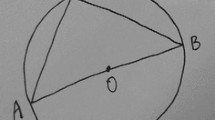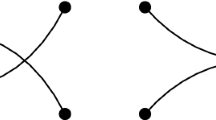Abstract
Chemical structure diagrams, just as in engineering drawings, maps, and other technical diagrams, consist of solid and dashed lines (bonds), characters (atom symbols), and other symbols such as brackets, parentheses, wedges (stereo-up bonds) or dashed wedges (stereo-down bonds). In addition to recognizing these low-level elements of such drawings, other artifacts may be present — bonds intersections may be crossings or atom nodes, character strings may represent underlying chemical structure, and circles are sometimes used to represent ring-alternating bonding — requiring a considerable knowledge base of chemistry to be able to interpret correctly. This paper discusses the general processes used in the program Kekulé 1 that embodies this interpretation ability with more detailed explanations of how some problems relating to polygon approximation, dashed line and dashed wedge finding, and optical character recognition were solved.
Work on this project was supported in part by the National Cancer Institute under SBIR Grant 5 R44 CA47241.
Preview
Unable to display preview. Download preview PDF.
Similar content being viewed by others
References
Rozas, R.; Fernandez, H. Automatic Processing of Graphics for Image Databases in Science. J. Chem. Inf. Comp. Sci. 1990, 30, 7–12.
Contreras, M. L.; Allendes, C.; Alvarez, L. T.; Rozas, R. Computational Perception and Recognition of Digitized Molecular Structures. J. Chem. Inf. Comp. Sci. 1990, 30, 302–307.
Pavlidis, T. Algorithms for Graphics and Image Processing; Computer Science Press: Rockville, MD, 1982; pp 281–297.
Rosenfeld, A.; Kak, A. C. Digital Picture Processing; Academic Press: Orlando, FL, 1982; Vol. 2, pp 121–126.
Kasturi, R.; Alemany, J. Information Extraction from Images of Paper-Based Maps. IEEE Trans. Software Eng. 1988, 15 (5), 671–675.
Govindan, V. K. Character Recognition-A Review. Pattern Recognit. 1990, 23 (7), 671–683.
Hu, M. K. Visual Pattern Recognition by Moment Invariants. IRE Trans. Inf. Theory 1962, 2, 179–187.
Khotanzad, Al; Hong, Y. H. Invariant Image Recognition by Zernike Moments. IEEE Trans. Pattern Anal. Mach. Intell. 1990, 12 (5), 489–497.
Teague, M. R. Image analysis via the general theory of moments. J. Opt. Soc. Am. 1980, 70 (8), 920–930.
Persoon, E. Shape Discrimination Using Fourier Descriptors. IEEE Trans. Syst., Man, Cybern. 1977, SMC-7 (3), 170–179.
Zahn, C. T.; Roskies, R. Z. Fourier Descriptors for Plane Closed Curves. IEEE Trans. Comput. 1972, C-21 (3), 269–281.
Korpel, A. Gabor: frequency, time, and memory. Appl. Opt. 1982, 21 (20), 3624–3632.
Reber, W. L.; Lyman, J. An Artificial Neural System Design for Rotation and Scale Invariant Pattern Recognition. Proc IEEE 1st Int. Conf. Neural Networks 1987, 4, 277–283.
Lashas, A.; Shurna, R.; Verikas, A.; Dosinas, A. Optical Character Recognition Based on Analogue Preprocessing and Automatic Feature Extraction. Comput. Vision, Graphics, and Image Process. 1985, 32, 191–207.
Kahan, S.; Pavlidis, T.; Baird, H. S. On the Recognition of Printed Characters of Any Font and Size. IEEE Trans. Pattern Anal. Mach. Intell. 1987, PAMI-9 (2), 274–288.
Jackel, L. D. et al; Hardware Requirements for Neural-Net Optical Character Recognition, IEEE Int. Joint Conf. on Neural Networks, 1990, Vol. 2, pp 855–860.
Rogers, A. Kekulé for Windows: The Complete Structure Input System. Journal of Chemical Information and Computer Science, 1994, 34, pp 1225–6.
Seiter, C. Kekulé 1.1. MACWORLD, November 1994, pp 63–4.
Yip., C. W., et al. Scanning for Structures. Analytical Chemistry, 1994, Vol. 66, No. 24, pp 1216A–1217A.
Author information
Authors and Affiliations
Editor information
Rights and permissions
Copyright information
© 1996 Springer-Verlag Berlin Heidelberg
About this paper
Cite this paper
McDaniel, J.R., Balmuth, J.R. (1996). Automatic interpretation of chemical structure diagrams. In: Kasturi, R., Tombre, K. (eds) Graphics Recognition Methods and Applications. GREC 1995. Lecture Notes in Computer Science, vol 1072. Springer, Berlin, Heidelberg. https://doi.org/10.1007/3-540-61226-2_13
Download citation
DOI: https://doi.org/10.1007/3-540-61226-2_13
Published:
Publisher Name: Springer, Berlin, Heidelberg
Print ISBN: 978-3-540-61226-1
Online ISBN: 978-3-540-68387-2
eBook Packages: Springer Book Archive




